To view student's poster, click on the picture to the right of each name.
Sujan Badal
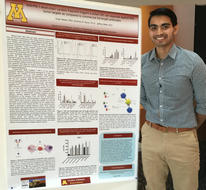
Before joining the Summer Medical Student Research program, Sujan Badal previously explored the effects of common fluoroquine antibiotics on dioxygenase enzymes as part of his involvement in the Post-Baccalaureate Research Program, or PREP, at the Mayo Graduate School in Rochester, MN. This past summer, Sujan joined the lab of Dr. Jeffrey Miller, working to determine if checkpoint receptor PD-1 is expressed in healthy blood cells, and if so, could PD-1 blockade in the signaling pathway be used to enhance NK cell function.
Cody Dail
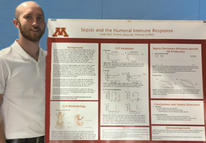
This summer, Cody Dail studied a Cecal Ligation and Puncture (CLP) mouse model with Dr. Thomas Griffith to discover whether it could mimic the symptoms of sepsis in order to determine if an optimized method of imaging germinal centers in septic animals could be created. Before arriving at the program, Cody worked at the FDA to develop vaccines for infectious diseases such as HIV, VEE, and Hepatitis C, and studied at the University of Minnesota’s Stem Cell Institute to investigate the role of the endosteal niche microenvironment in mesenchymal stem cell differentiation into osteogenic cells.
Emily Ewan
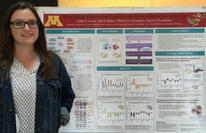
In her undergraduate years at Macalester, Emily Ewan was a recipient of the Edens Global Health fund research grant, and conducted research on zoonotic diseases in Kampala and Queen Elizabeth State Park during a summer in Uganda. Emily was also a member of Dr. Chatterjea’s immunology lab, where she endeavored to characterize a murine model of vulvodynia. Working with Dr. Tanya Freedman this past summer, Emily explored the effects of priming SFK macrophages with polarizing inflammatory stimuli to discover if this would upregulate LynA protein expression with IFNγ.
Emily Hartsough
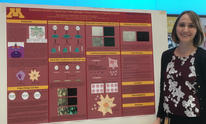
Prior to her acceptance into the Summer Medical Research Program, Emily Hartsough worked in the undergraduate immunology laboratory of Dr. Chaput at the Biodesign Institute, learning a variety of recombinant biological techniques, and was able to publish the results of her honors thesis, “Comparative Analysis of Eukaryotic Cell-Free Expressions Systems,” in a peer-reviewed journal. Emily trained with Dr. Kaylee Schwertfeger this summer to examine STAT3 signaling in breast cancer cells in order to visualize tumor-associated macrophages and to further characterize their expression profiles.
Elizabeth Roeske
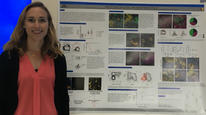
Elizabeth Roeske’s interest in scientific research began when she was an undergraduate at University of Wisconsin-Madison and was awarded the Hilldale Undergraduate Research Fellowship. Elizabeth worked in the lab of Dr. Kate O’Connor-Giles to develop a protocol and pipeline for dissection of embryos, antibody staining of synapses, and confocal microscopy. During the program, Elizabeth studied CD4+ T cells in the lab of Dr. Marc Jenkins to determine their role in the regulation of granuloma-like structures, which form in response to infected macrophages, and concluded that CD4+ T cells play a role in the resolution of said structures.
Tom Schmidt
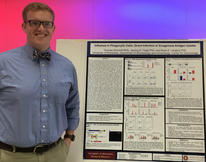
Tom Schmidt previously studied at both the University of Minnesota and Johns Hopkins, earning his undergraduate and Masters degrees before joining the Summer Medical Research Program. Tom also worked at the FDA, where he developed an in vitro culture system to test tuberculosis vaccine candidates, and studied the TACI receptor in mice to decipher its importance in childhood morbidity associated with malaria. This summer, Tom worked with Dr. Ryan Langlois to study the traffic of phagocytic immune cells to secondary lymphoid organs to determine that subunit vaccinations are a viable treatment option for Influenza A virus (IAV).
Joseph Slaughter
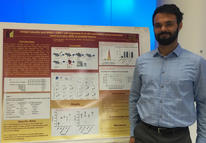
For over three and a half years Joseph Slaughter worked in the lab of Dr. Anindya Bagchi at the Masonic Cancer Center, studying genetically engineered mice carrying the genetic mutations seen in pancreatic adenocarcinoma (PDAC) patients and examining the role of Hif1α in PDAC aggressiveness. Joseph trained with Dr. Yoji Shimizu during his time in the Summer Medical Student Research Program to characterize SPAS-1 antigen specific T cell memory and secondary tumor burden after focal therapy and surgical resection combined with anti-CL4 immunotherapy.